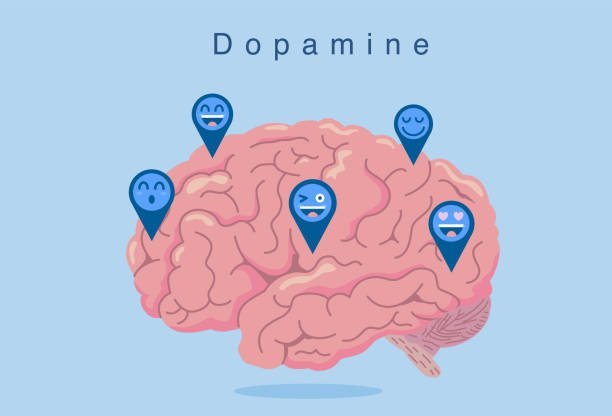Advancements in Maintaining Neurotransmitter Balance:
Dopamine, that elusive neurotransmitter often hailed as the
“feel-good” chemical, dances intricately through the corridors of our
brain, influencing our every move from motivation to mood. But as scientists
delve deeper into its labyrinthine pathways, they uncover a delicate balance
that, when disrupted, can tip the scales toward mental health disorders like
schizophrenia, depression, and addiction. Recent research is shedding light on
this intricate dance, offering glimpses into potential therapies and strategies
that could harmonize our dopamine levels and, in turn, enhance our mental
well-being.
Dopamine:
The Brain’s
Conductor of Emotion and Action:
Imagine dopamine as the conductor of an orchestra, guiding
emotions, actions, and even our sense of pleasure and reward. It originates in
key areas of the brain like the substantia nigra and the ventral tegmental
area, where its release can spark feelings of joy from a delicious meal or the
thrill of achieving a long-sought goal. This neurotransmitter isn’t just about
happiness—it’s crucial for movement, learning, and decision-making, playing a
pivotal role in shaping our daily lives.
The Tightrope Walk:
Balancing
Dopamine for Mental Health
Too much or
too little dopamine can throw off this delicate balance, leading to significant
mental health challenges:
Schizophrenia: Excess dopamine activity
in specific brain regions has been linked to hallucinations and delusions
characteristic of schizophrenia.
Depression: Conversely, low levels of
dopamine are associated with symptoms like lack of motivation and pleasure, key
features of depression.
Addiction: Drugs that increase dopamine
levels, such as cocaine and amphetamines, hijack the brain’s reward system,
contributing to addiction.
Understanding
these dynamics has spurred a quest to decipher how we can fine-tune dopamine
levels to promote mental wellness.
Cutting-Edge Insights:
What Recent Research Reveals
1. Genetics in the Spotlight:
Researchers
are uncovering genetic variations that influence how dopamine receptors
function and how dopamine is synthesized. These genetic quirks can predispose
individuals to certain mental health conditions and affect their response to
treatment. By understanding these genetic blueprints, scientists are inching
closer to personalized therapies tailored to individual needs.
2. Peering into the Brain:
Advances in Neuroimaging
Thanks to
advancements in neuroimaging technologies like fMRI and PET scans, scientists
can now peer into the brain’s inner workings with unprecedented clarity. These
tools reveal dopamine pathways in action, providing insights into how they
function differently in individuals with mental health disorders compared to
those without. This visual window into the brain is revolutionizing our
understanding of dopamine’s role in psychiatric conditions.
3. From Pills to Practices:
Innovative Therapies
Beyond
traditional medications, researchers are exploring novel therapies that target
dopamine pathways with greater precision and fewer side effects. For instance,
new antipsychotic medications aim to modulate dopamine receptors implicated in
schizophrenia symptoms while sparing other brain functions. Additionally,
behavioral interventions such as exercise and mindfulness practices are being
studied for their natural ability to boost dopamine levels and support mental
health.
4. Decoding Decision-Making:
Dopamine’s
Influence
Dopamine
isn’t just about pleasure—it also wields significant influence over our
decision-making processes. Research is uncovering how dopamine affects our
risk-taking behaviors and impulsivity, providing clues that could lead to interventions
targeting specific dopamine pathways to mitigate psychiatric symptoms.
Challenges on the Horizon:
Where
We Go Next
While the future of dopamine research shines bright,
challenges loom large:
Personalized Medicine: Tailoring
treatments based on genetic profiles and neurobiological markers remains a
complex puzzle.
Long-Term Effects: The impact of
chronic medication use on dopamine receptors and overall brain health demands
careful scrutiny.
Ethical Considerations: Manipulating
dopamine pathways raises ethical questions, particularly concerning vulnerable
populations and the potential for unintended consequences.
Conclusion:
A Symphony of Hope for Mental Health
As we
navigate the twists and turns of dopamine research, one thing is clear: the
quest to balance its levels holds immense promise for improving mental health
outcomes. By unraveling its mysteries and developing targeted therapies,
researchers aim to restore harmony to the brain’s dopamine pathways. In doing
so, they not only aim to alleviate symptoms but also to enhance the overall
quality of life for those affected by mental health disorders.
In essence,
the journey to understand and balance dopamine is not just about chemicals and
neurons—it’s about unlocking the potential for a brighter, healthier future for
us all.




